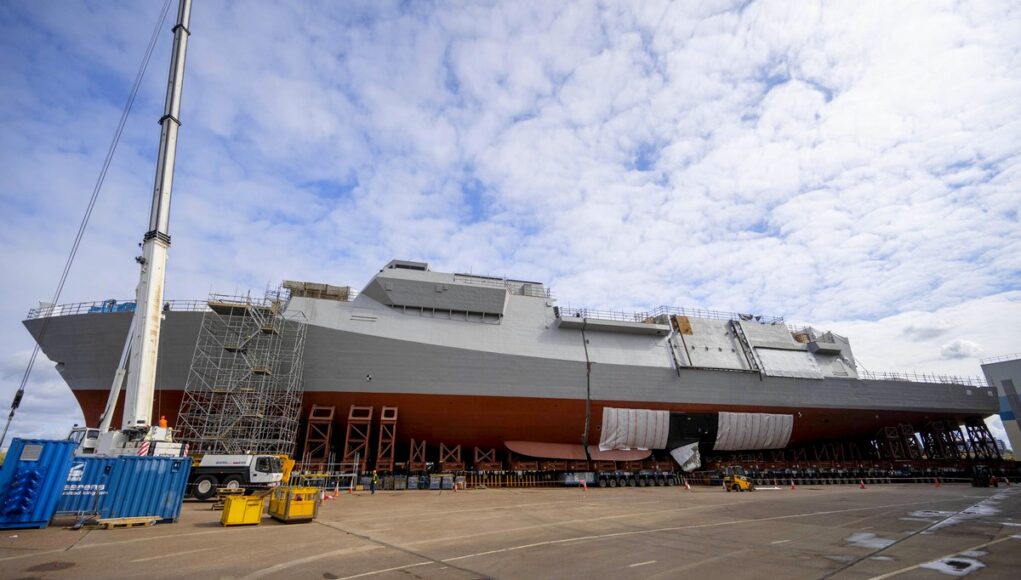The Ministry of Defence have published a report detailing regional expenditure with UK industry and the supported employment of that expenditure.
The report presents MoD expenditure with UK industry and commerce in 2019/20 by UK region and industry group.
“The number of direct and indirect jobs supported by this expenditure in the UK is also presented. The statistics include direct MOD expenditure with UK industry and commerce only, and exclude all other MOD spend types. It is estimated that MOD expenditure supported 202,000 FTE jobs in the UK in 2019/20 which is equivalent to 1 in every 130 jobs. This figure includes both direct and indirect jobs so accounts for employment through direct supplier payments as well as that arising through the supply chain.”
The report states that it is just over 6% higher than estimates for 2018/19 when 190,000 jobs were supported.
Parts of the UK with the highest spend, in order, are as follows.
- South West
- South East
- North West
- Scotland
- London
- East of England
- Wales
- East Midlands
- West Midlands
- Yorkshire and The Humber
- North East
- Northern Ireland
The report advises that The South West had the largest increase of MOD expenditure in absolute value, and despite already being the region receiving the largest proportion of MOD expenditure, this was still an increase of almost 7% from 2018/19.
“Scotland, the North West, the South East and the West Midlands also saw substantial increases in regional expenditure of over £200 million each in 2019/20 compared to the year before.
Scotland is the only UK region to have seen an increase in year-on-year spending in each year since 2013/14. Compared to the previous year, Scottish expenditure increased by almost 15% in 2019/20 and its regional total now accounts for a little over 10% of all MOD expenditure with UK industry. This was driven principally by increased in-year payments to BAE Systems Surface Ships Ltd relating to the manufacture and demonstration phase of the Type 26 frigate programme out of the company’s Glasgow shipyards.
London observed the largest reduction in total expenditure in absolute terms from 2018/19 to 2019/20 where it fell by £365 million. After holding steady around the £1.5 billion mark for the previous three years, this fall places the region’s expenditure at its lowest level over the period between 2013/14 and 2019/20. This was predominantly due to a reduction in payments for Aircraft and Spacecraft, and Technical, Financial and Other Business Services.”
MoD Expenditure by Region 2019/20
The above is a horizontal bar chart showing MOD’s regional expenditure in descending order for 2019/20. The South West and South East appear first and second respectively, accounting for over half of all UK spend.
“The South of England received 52% of MOD expenditure in 2019/20 and has consistently received over half of total spend in each year from 2013/14 onwards. It is perhaps not surprising that this collective area of the UK is the dominant recipient of MOD spending since a high proportion of the MOD’s biggest suppliers can be found in the South East and South West of England including Babcock, BAE, Rolls-Royce and Thales, among others.
The largest single in-year contract payment in 2019/20 was with Devonport Royal Dockyard Ltd at £734 million. Although for the most part operated out of the main Devonport site in Plymouth, this contract saw work further contracted to Scottish shipyards. The contract’s combined work on the Maritime Support Delivery Framework ensures the continuing support of the Royal Navy’s surface fleet, including the two Queen Elizabeth class aircraft carriers.”
The report advises that this single contract payment itself was greater than the amount spent in Yorkshire and The Humber, the North East and Northern Ireland combined.
“The disparity in spending between regions is such that for every £1 of MoD expenditure in 2019/20, 28 pence effectively went to the South West whilst less than 1 pence went to each of the North East and Northern Ireland.”
MoD Expenditure per Person with UK Industry by Region 2019/20
Below is a map of the UK split by region showing MOD expenditure per person in 2019/20. Even after adjusting for regional populations, the South of England still shows the highest expenditure levels.
According to the report, London falls to 9th place in Figure 4 from 5th in Figure 2 (which displays total expenditure) due to its high population density. Wales, in contrast, historically ranks higher when expenditure is adjusted by population.
“However, after increasing by 11% the year before, expenditure in Wales in 2019/20 fell by 18%. This wasn’t necessarily due to contracts beginning or ending but a combined effect of lower in-year payments to the region, showing the nature of the inherent variability of contract data. Coupled with an increasing population, this led to a decrease of almost £70 per person. With the exception of Wales, four of the top five ranked UK regions in 2019/20 for MOD expenditure per person all saw considerable increases to their regional expenditure. Outside of this grouping, only the West Midlands saw a substantial increase in spending between 2018/19 and 2019/20.”
The additional spend for the West Midlands was driven by increased payments to Babcock DSG Ltd for fleet management, repair and maintenance services of military vehicles and weapon systems.
Key Points from the report
| £20.3bn | Total MOD expenditure with UK industry and commerce. |
| This is a 3% increase on 2018/19’s reported expenditure after adjusting for inflation. | |
| £300 | MOD expenditure with UK industry for each person living in the UK. |
| With inflation accounted for, this figure has remained the same for the fourth year in a row. | |
| 202,000 | Total number of direct and indirect jobs supported through MOD expenditure with UK industry. |
| This comprised of 125,000 direct jobs and 77,000 indirect jobs in 2019/20, up from a combined total of 190,000 the year before. | |
| 1 in 130 | Proportion of all direct and indirect jobs in the UK which are supported as a result of MOD expenditure with UK industry. |
| This remains unchanged from 2018/19. | |
| 77,000 | Total number of direct and indirect jobs supported in Technical, Financial and Other Business Services as a result of all MOD expenditure with UK industry. |
| Total MOD expenditure supports more jobs in this sector than in any other industry group. | |
| 22% | The rise in direct jobs supported from MOD expenditure in Scotland since 2018/19. |
| Increased expenditure on Construction and Shipbuilding in Scotland helped to boost total direct jobs supported in the region in 2019/20. |
You can read more for yourself here.
















Of course it is. Nothing like an injection of cash to keep Scotland in the UK.
To all our Scottish friends remember if you push for independence that tap gets turned off and you’ll be lumbered with the Euro instead of the Pound!
Very true. I wonder how Scotland will afford to pay for itself. It has a very small population (5.5million) as of 2019.
Long time reader never commented.
But posts like this really annoy me.
Two points, how do other small countries pay their ways, why is it only Scotland who apparently can’t afford to.
With a GDP per head almost identical to the UK average, are the same questions asked re the UK.
I’m not advocating independence, or even the status quo, but to constantly suggest its not possible is simply wrong.
Point 2
With 8.4% of population and 8.9% of tax take why is it so shocking that 10% of defence expenditure is spent in Scotland.
Hi Mike, In general terms, there are many successful, small European countries able to finance themselves: Norway, Denmark, Finland (all with about the same population as Scotland) – plus a few considerably smaller, Croatia, Baltic states etc In that context, size is no barrier to the viability of an independent Scotia.
But an independent Scotland would be unable fund the current high levels of public spending, it would be forced to cut spending -or introduce stinging tax rises. Scots would certainly need to get used to a lower level of public services – fewer public sector jobs, and meagre defence work. This hypothetical scenario has been described as “Austerity on Stilts!” Fiscally possible, of course – but politically and socially unpalatable to most Scots. Plus after a short period flirting with “sterilisation” – Holyrood would undoubtedly be forced to introduce a Scottish pound, probably worth 20-30% less than the British pound – and a huge drop in purchasing power for many fellow Scots.
I would argue there are also strong bonds of fraternity and kinship that keep Scotland within the UK, but the medium-term economic challenges of going it alone are daunting. Many would argue: why accept such economic pain – when Scots are already a free people, and indeed disproportionately influential within the UK.
Give Scotland its share of the national debt and come back to us on that. Most of them small nations have managed to run their finances well, something the UK really hasn’t. Well with the exception of Greece/Ireland/Iceland which required bailing out and will suffer the impact of that over time (still early days)
Ireland already paid it’s 2010 bail out and has the highest GDP in Europe. UK took 56 years to pay its post WW2 US bail out.
Lux is the highest GDP per capital in Europe (Germany highest overall) however Ireland is for sure doing well. It has some major issues pending though, since its economy is heavily reliant on tax haven status with US tech companies. Either europe will continue to stamp down on it or the housing crisis (lack of houses) / lack of infusture will hit the growth hard. It’s a shame that the UK continues to ignore its national debt, not that Ireland is out of the water on that front either
Strong bonds indeed and the proverbial scrambled eggs. Our son was born in SA of an English mother and London born Ulsterman. His one Grandfather was born in England of a Welsh mother and Edinburgh born Scots mother. On my side his Grandparents were both from Belfast,Scots Irish on my dad’s side and Scots-Welsh(with a touch of Spanish Armada blood) from my mum! This kind of ancestral history is repeated all over the United Kingdom!
The Union was clearly a disaster for Ireland and Northern Ireland over the years, you can’t argue with that. Wales seems happy. Scotland in its hearth wants out of that Union, as England wanted out of the European Union. Scotland swill decide for its self as England did. That’s fair.
Can’t fault your logic on any of that Alan. Was trying to stay out of this one as I had a pretty good idea that it would dive down some of the familiar rabbit holes.
Keep fighting the good fight brother.
Thanks Andy – and I managed to avoid falling foul of the new moderation rules too!
Hard to tell what you can say about this moderation system.
You mistake current UK public spending with what may, remember may be the case in an independent Scotland. Don’t also forget that our draft budgets have been based on managing ALL of our tax income not just the 50% or so we get given back. And that spending will be on what Scotland wants. We are not intersted in building aircraft carriers or HS2 etc. We also will not be leading foreign wars. Friendship and fraternity are not controlled by borders and neither will be joint defence matters, NATO, our existing dependencies, and other treaties we are all part of. I don’t think you’ve watched any news media. Scotland’s views are invariably dismissed, aling with those of the other home nations. Where the assumption about 20%-30% less with comes from is pure speculation. We would need our own currency of course. But it is arguable that the GBP is overvalued and based on a reducing level of financial services instead of real personal wealth generation through manufacturing or adding value to raw materials which is what all good economies thrive on and how we did so well in the 19thC before other countries started doing the same. Essentially the status quo will change, and therefore it is completely inappropriate to assign with certainty the current UK economic structure to that of rUK in the event of Scottish independenc. The same situation was argued about our independence from the EU!
Certainly not defence wise, and Luxembourg gets away with it as it’s the most bent country in Europe, while getting the highest percentage of EU funding. Not good examples to use I’m afraid Mike.
Malta benefits from being in the backyard of the most powerful Mediterranean fleet, the Marina Militare, which has exactly zero interest in seeing Malta occupied by any sort of foreign power.
Luxemburg is smack in the middle of Europe surrounded by the two most powerful European Land forces (France and Germany) and is entirely reliant on good relations with them for it’s existence.
Ireland requires the UK to police it’s Airspace, and is sandwiched between the Royal Navy, that again has exactly zero interest in seeing the waters around Ireland being utlized by it’s enemies, and the American and Canadian navies.
None of these are nations that “manage” on their own in any kind of realistic scenario.
Yep. I love how people want to separate from Britain but will still need them to provide for just about everything. lol
No they don’t and are not asking to. Where did you get that idea from?
But don’t those depend on others for 90% their defense?
I thought the motivation for independance is mostly ideological? I’m not sure the position has or will change much. Most Scots realise that there is little to be gained by being in control of their own defence & foreign policy so devolved Government gives them the best of both worlds.
I think it is in the interests of all UK nations for defence spending to remain strong in Scotland but also expand into the rest of the UK?
Indeed, Mark – in this era of identity politics, I believe support for Scottish separatism is ideologically based.
Yeah, most of the ‘freedum’ voters I know are wildly idealistic about it rather than pragmatic. Nationalism is one of the more insidious forms of politics. For some reason it’s one of the base ‘identities’ that we cling to. Maybe because it’s less changeable, dunno. I do think it holds us back as a planet because of these divisions though, not that it’ll change any time soon.
Wrong, and completely misinterpreted. The issues are broadly speaking the way the Westminster uberlords handle and do things to serve their self interests before everybody else. Using the contention that my self-interest has to be good for you so shut up and do what you are told.
“Wrong, and completely misinterpreted”
😂 Fair enough, who needs debate.
Because blinkered unthinking repetitions of misleading statements does nothing to indicate the ability of people to understand all the things that to make up a situation! Debate is fair, but blind obedience is not! Such statements are meaningless!
There is no imperative for the Euro. Don’t know where you get that idea from. The EU have repeatedly said that it is not compulsory. EU membership is not constrained by using the Euro. We would have our own currency to be sure, which IS a prerequisite of the Euro if that is what the Scots want in the event of independence. Don’t forget that Scotland, (and NI and Wales) also pay taxes. Scotland is no more dependent on financial aid than any other part of the UK. And don’t forget that in previous years there has tended to be a lower proportion of defence spending so it is only catch up at best. And with app 10% of the population of the UK it isn’t unreasonable that 10% defence expenditure occurs here. What is distorting your knowledge of the Scottish budget by forgetting that we choose to spend what is handed back to us from our taxes in a different way. Assumptions about Scotland based on England which the broadcast media ALWAYS base their analyses on are invariably wrong. If you listen and watch they do actually state England and Wales statistics frequently.
Only by a small amount. And the world has completely moved in since then. The ‘Vow’ all in int together, powers etc have not been implemented. Stay in EU was part of that. So the world has moved on significantly so the time is right to re-examine the situation with fewer fasle promises, lies and more informed discussion. We get to choose a parliament and council every 5 years. We aren’t Russia where Putin gets to stay in place decade after decade. The world moves on circumstances change and therefore it is reasonable to question whether or not the status quo remains valid. And not forgetting that unlike Wales and NI Scotland is a soveriegn country in its own right. It is only a treaty of union that keeps us together. A treaty no less to which independent parties enter into. A treaty like the EU for example. And the arguments for leaving the EU are exactly the same as those for Scottish Independence.
Scotland will do very well, we get shafted by Westminster.
this is nothing but crumbs to try and get us to stay! It won’t work!
https://m.youtube.com/watch?v=sbUZkKD-jrY
It was always going to be, Northern Ireland seems to have potential to have a large defence industry if H&W got its act together and erlived its glory days… but thats not gonna happen
Why?
Have you not seen the state of it? Down to a few hundred personel, minimal dockside facilities. That said, the door is still wide open
Could the facilities be brought up to scratch given contracts for a decent quantity of work? Seems an obvious way to push growth in NI?
There are advantages
a) space dockside for a proper covered production line
b) clean piece of paper
c) massive existing dry docks
And disadvantages
a) lack of skilled workforce
b) strange half world border situation with EU having some degree of controls
Given the Babcock frigate factory was pretty cheap I don’t see why something better could not be done at H&W given the greater space. As Sir Gerry Robinson was fond of saying “it is worth spending time and money making a (production) line as efficient as possible”
But some of the disadvantages can be mitigated; Eg the H&W+Navantia team’s FSS plan, Leveraging Navantias know-how allows H&W to offset it’s lack of skilled work force.
And potentially, being semi-in the EU might actually allow H&W to play EU tariff rules to it’s advantage.
One of the reasons I’m in favour of the National Flagship btw, even if H&W doesn’t get the FSS contract (personally I think they should, and NFS go to CL but hey ho), is that it can be a good project to get them started.
Hi Goldilocks, And remember the one part of the UK most likely to leave is Northern Ireland – not Scotland.
Really? Don’t know you come to that conclusion.
Hi Jacko, Firstly, I mean no offence. I don’t say that it’s imminent – only that Northern Ireland is closer to leaving than Scotland. And in my view, Scotland is a long, long way from going independent – whatever the claims of separatists.
But Scotland is still a full member of the UK internal market. Since Brexit, however, one can argue Northern Ireland now has a different status.
Indeed, economically, as things stand at the moment – Brexit has made a united Ireland more likely, but an independent Scotland more UN-likely.
Hi Alan. Regarding NI my head says it makes sense but my heart says NEVER, NEVER NEVER!! And if you know the Unionists of NI it will be a fight to the finish.
Maybe a further partition-give the ROI a couple of counties?
Hi geoff, I don’t say that Northern Ireland leaving the UK is going to happen (or would be a good thing). But on the subject of the constitution, fellow posters seems to focus too much on Scotland – but there is another part of the UK that has a far longer history of nationalism than Scotia (and until the recent past – violent nationalism); indeed Northern Ireland already has distinctively different constitutional arrangements with foreign powers – ie Ireland and the European Union.
It’s maybe something to bear in mind when some on this forum wish to prevent Scotland winning defence contracts – but seem much more relaxed about giving them to another part of the UK much further down the road of separatism.
Well said Alan. I hoping neither leave and that the UK remains intact
The reason is the cutbacks on manufacturing imposed on the small home nations over the last 30 to 40 years. And with nothing substantial to replace them.
Now there’s a surprise. Not.
What defence industries are in Yorkshire and the N East to increase their % share?
This chart with Labour at the helm would have been similar based on the long standing locations of defence related industry.
Or would you prefer HMNB moved to Hull?
We would welcome a HMNB in Hull with open arms. Well i would anyway 😃
I thought of you when I said that! 😆
😄 It’s all wind turbines in Hull now. Not quite as exciting as a T26, but good for local employment. 👍
Probably more of a market for wind turbines and a safer economic bet than depending on government work for your local economy. Look at the rocky ride a lot defence related industries have in this country.
I work in the offshore wind industry, so it is great for the Hull area. Some decent well paying jobs. We had the BAE Systems factory down the road from me at Brough. It’s still open, but a fraction of the size it once was. I did my work experience at the site back in 94. Around 5000 worked at the site back then. It’s less than 500 now.
Yorkshire sounds like a good place to start a business & I bet I’m not the only one thinking that. Might take a few years but I suspect the growth levels will surge.
I’m not understanding the headline compared to the content. As the south west also received increased spending. It smells a bit like Scot baiting to me.
The headline is a tad deceiving at first glance.
The headline says “Scotland only part of UK to see increased defence spending”, the text quotes “Scotland is the only UK region to have seen an increase in year-on-year spending in each year since 2013/14.”
👍
The headline says “Scotland only part of UK to see increased defence spending”, the text quotes “Scotland is the only UK region to have seen an increase in year-on-year spending in each year since 2013/14.”
I think ukdj has gone a bit OTT on censoring your flag system is being abused sort it out please.
We’ve found the best balance we can, to be honest.
I wonder why we need to increase defence spending? Could be a good reason?
11 AUGUST 2021
“Large-scale exercise points to growing Sino-Russian military co-operation”
https://www.janes.com/defence-news/news-detail/large-scale-exercise-points-to-growing-sino-russian-military-co-operation
11 AUGUST 2021
“Russia receives 200 main weapon systems during first half of 2021”
https://www.janes.com/defence-news/news-detail/russia-receives-200-main-weapon-systems-during-first-half-of-2021
It isn’t going to get increased beyond what’s already been announced. We have a pandemic recovery to pay for.
You have been told to stay off my posts by the site moderators.
Nothing received my end. You disappeared for a few months. And now you are back. If you can’t handle people challenging what you post, don’t post.
No one has been told to stayy off of his posts. Feel free to respond when you wish.
Thanks George 👍
No he hasn’t, Robert is free to comment on whatever post he wishes to.
What does it matter? We’re all one big happy United Kingdom, right?
Amongst normal people. Yes we do all get along.
FFS bore off with your childlike tantrum comments.
😄👍
Is that HMS Glasgow in the photo?…
Yes – what a beauty!
Cheers Alan, somehow missed the news that the sections had been joined!
Type 26 is a thing of beauty.
That doesn’t make any sense considering the amount of share in the North West.
I think ukdj has gone a bit OTT on censoring your flag system is being abused sort it out please.
There’s no shipbuilding in the North East now. If Swan-Hunter hadn’t screwed up the build on RFA Lyme Bay then maybe there would be and the frigate programmes shared between Scotland and the North-East.
Here is my take on a subject near to my heart. I would not want a Scotland that ONLY wants to stay part of the UK for financial reasons any more than a wife that saw me as a sugar daddy. There are and there has to be many other reasons-close ties of kinship, a shared language, a shared Island home, a shared history, hundred of thousands of Scots who live and work in England and English in Scotland, the vast majority of whom are Unionists. There are of course other logical reasons to stay together-shared infrastructure, the strength that derives from a well established and centuries old Union. All of this, the positive side, must be emphasised and given a voice. Stories about how much one part of the Union gives another-there are a wide variety of economic inequalities all over the UK-not just between parts of Scotland and England, stories of how Scotland couldn’t do without us etc are all hugely counter productive. If Scotland were to leave the UK we lose a huge chunk of strategic(and beautiful) territory plus a part of the culture and identity that has made us British
I follow your logic to an extent but to use your analogy it sounds like you want a ‘Stepford wife’ (don’t we all).
We’re in the fecked up position of Scotland.both being a region of the UK and a separate country. A bit of a mess but it’s where we are. The SNP being a massive wrecking ball doesn’t help but the SNP aren’t Scotland. Andy Burnham is doing a similar thing in Manchester, he’s fought the government on covid cash and generally enjoyed his time in the spotlight, he doesn’t draw the same fire.
If an area of the country are feeling aggrieved then they should be moaning about it, their elected representatives definitely should. This falls over when you as an individual don’t agree with what they’re saying. That’s democracy for you, at least our version of it. As for only staying for the cash, well as a provider for a family, we all sell our souls for cash, it’s been a motivator throughout history.
All good logic Andy. As I have said before, the UK “Constitution” needs an overhaul from top to bottom containing as it does, many glaringly obvious absurdities. I understand the cash-of course but for me it is purely down to identity. If being British fails, then for me I am stateless. If the Union Jack fades then put a Black Flag on my coffin. Illogical yes but there you have it
Cheers
Fair enough Geoff, arguably I over intellectualise nationalism/patriotism. I agree that the constitution could do with an overhaul, if we were going to design it now then it would be pretty different to the hodgepodge we have now but even newer countries like the US have their amendments, things get tweaked along the way. I’d love it if the UK was able to come up with an ‘all singing, all dancing new constitution’ but it would maybe require at least one referendum and a lot of hot air….. can’t see it myself.
I’ll try and avoid diving too far into the politics of nationalism/patriotism. We all come from ‘somewhere’ and it just strikes me as a weird thing to be proud (or ashamed) of, although most of us do it.
Hi Andy. Forgot who said patriotism is the last refuge of the scoundrel etc but I got bit badly with the bug at an early age-post war Britain in the 50’s-Reach for the Sky, Dambusters and then 12th July parades in Belfast as a wee boy with all the flags and uniforms-mesmerising. NEVER got the bigotry bit but the Brit bit stuck. Then Colonial Africa-Union Jack flying in the forecourt at school in Rhodesia and then finally renegade Natal whose audiences at the pictures clapped when the Queen came on screen in Movietone News! How could I escape from all that!? Laurence Olivier was spot on when he talked of his”absurd patriotism”
Cheers
ps United Federal States of Britain and NI a la USA
Just a question-what is the default setting for the order of posts here? Is it newest on top unless altered by the person posting? When I post here I see my contribution appear on top but when I get a reply it appears at the bottom of the comments
Morning geoff, from an overcast, drizzly Surrey!
It appears at the top initially to you, the poster, then will shortly move to the bottom. So oldest posts are at the top so one can follow the development of a thread easily.
Hello Daniele from a chilly 15 degrees Durban. Worse inland at Van Reenens Pass on the Joburg road which facing closure due to heavy snowfall!! it can get cold in Africa! Thanks for the explanation regarding the posts-makes sense.
Google Van Reenens Pass Today
Cheers my friend
Just did!
What a load of crap, is that why the treasury is being set up in Darlington and the national infrastructure bank in Leeds?
Or the £95million into teeside and the humber for manufacturing wind turbines?
£71million to build the business zone in Redcar?
The list goes on.
Mac: There’s a wee crack down the middle of this boat.
Jock: Nay worries pal. I’ve still got some glue left.